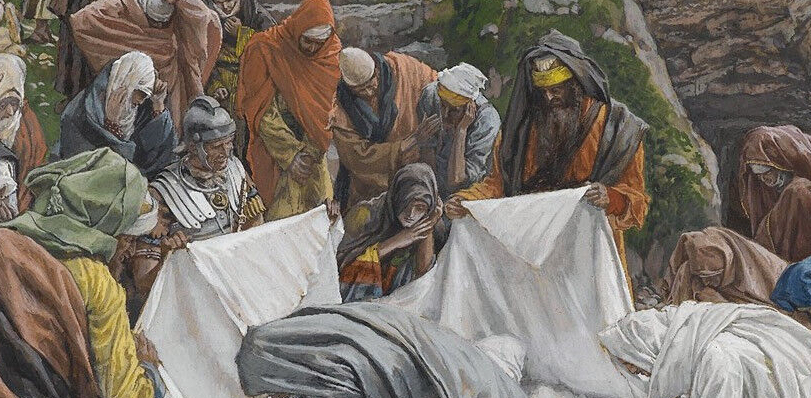“And after this Joseph of Arimathea, being a disciple of Jesus, but secretly for fear of the Jews, besought Pilate that he might take away the body of Jesus: and Pilate gave him leave. He came therefore, and took the body of Jesus. And there also Nicodemus, which at the first came to Jesus by night, bringing a mixture of myrrh and aloes, about a hundred pound weight. Then they took the body of Jesus, and wound it in linen clothes with the spices, as the manner of the Jews is to bury,” (John 19:38-40).
When the name “Joseph” is mentioned in the Bible, we typically think of the Old Testament character who was the favorite son of his father Jacob. He is well known not only for his colorful coat, but also for his colorful life and how he served and honored God regardless of the circumstances he found himself in.
Likely the next most familiar character in the Bible named Joseph is the man the virgin Mary was espoused to when she was visited by the angel Gabriel announcing that she had been chosen by God to bear his Son. This Joseph was a humble, upright servant of God who listened and obeyed God when he was told to take his young family and flee to Egypt to escape the wrath of King Herod and preserve Jesus’ life.
And though the Joseph referenced in our text here is maybe not as well known as the first two, as the text explains, he served an equally strategic role, taking care of our Lord’s body after his death. This Joseph is identified specifically in Scripture as “Joseph of Arimathea,” and the account of what he did for Christ following his death appears in each of the four Gospels: Matthew 27:57-61, Mark 15:42-47, Luke 23:50-54 and John 19:38-42.
In Luke’s account, this Joseph is described as a “good and just man” who did not consent to the Sanhedrin’s decision to crucify Christ. A respected member of the Jewish council, John explains that he secretly followed Christ because he feared the Jews (John 19:38). It wasn’t until after Jesus’ death that he openly declared his allegiance to the Lord when he boldly approached Pilate requesting permission to take the Lord’s body from the cross and prepare it for burial.
It seems that Joseph’s faith grew stronger through the Savior’s death, for the one he dares scarcely acknowledge amid all the glory of his miracles, he now boldly begs of Pilate. And though he no doubt experienced a flood of intense emotions as he watched the Lord’s passion and death play out, surely joy triumphed when he was permitted to retrieve his Savior from the wretched grasp of his enemies and the cruel instrument of his death and take him in his trembling arms to a place of safety.
But then a mixture of grief and horror must have surely overcome him to see Christ so mangled, so nailed that he could not free his body without first having to widen his wounds. And when the nails were finally removed, to see him still stuck fast to his jealous cross by his own dried blood and gore. This experience no doubt broke his heart in two. But at length, love overcame his fears, dried the cheek of his sorrows, strengthened his heart and calmed his soul such that Joseph could finally, gently, bring his Lord down from the rack of his cross to the bed of his grave.
At that point Nicodemus came with ointments to anoint Christ’s body for burial. Nicodemus, who had previously come to Jesus under the cover of darkness seeking answers, had also not dared to publicly own the Gospel for fear of the Law. But at this point he no longer remains a secret follower, for he too is now ready to make his allegiance known, regardless of the consequences.
After no doubt much weeping and sorrow, together they wash and dry his body and anoint the Savior for burial. As the night draws on, they wrap him in clean linen cloths and take him to Joseph’s tomb, one he previously secured for his own burial. They laid Jesus to rest in this pristine grave and then rolled a large stone over the entrance.
Though neither of these men outwardly followed the Lord during his earthly ministry, something happened at his death that solidified their faith and assured their spirit that this was, indeed, the Messiah, the Son of God. What they experienced in his death brought new life to their faith and new light to their souls, to the degree that none could doubt their love, devotion, and identification with this Christ of God.
Can the same be said of you?
Contemplations:
- Lord, how often have I begged for your presence, and then turned a deaf ear to your Word, your Spirit, or your sacraments? And if I did initially welcome you, how soon have I choked out the seed of your Word (Luke 8) and quenched the motions of your Spirit? (1 Thess. 5).
- Burn in my soul, Lord, the truth of the resurrection, for you are risen; you did not remain in this tomb. “I know that my Redeemer lives,” (Job 19:25), and that I shall see him with my own eyes. There being lifted up, draw me, Lord, to your side. Jesus my Savior is alive, and I know that I shall see him when I die!
Further References for John 19:38-40:
Matt. 27:57-58; Psa. 45:8; Luke 24:1; Song 4:14


